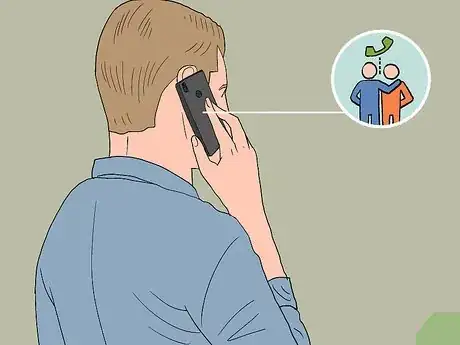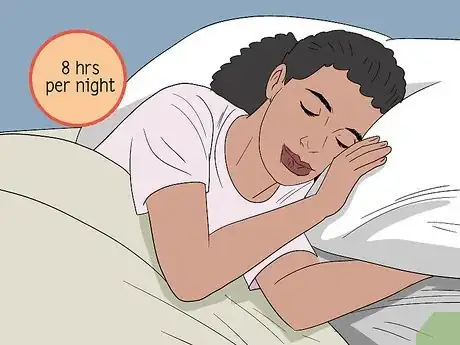This article was co-authored by Jennifer Butler, MSW. Jennifer Butler is a Love & Transformation Coach and the Owner of JennJoyCoaching, a life coaching business based in Miami, Florida, although Jennifer works with clients all over the world. Jennifer’s work centers around empowering women who are navigating any stage of the divorce or breakup process. She has over four years of life coaching experience. She is also the co-host of the Deep Chats Podcast along with Leah Morris and the host of season 2 “Divorce and Other Things You Can Handle” by Worthy. Her work has been featured in ESME, DivorceForce, and Divorced Girl Smiling. She received her Masters of Social Work (MSW) from New York University. She is also a Certified Health Coach, a Communications & Life Mastery Specialist, and a Certified Conscious Uncoupling and Calling in “the One” coach.
There are 15 references cited in this article, which can be found at the bottom of the page.
wikiHow marks an article as reader-approved once it receives enough positive feedback. In this case, several readers have written to tell us that this article was helpful to them, earning it our reader-approved status.
This article has been viewed 101,240 times.
We'd all like to be more carefree, living joyous lives full of glee. The trouble is that we all have troubles. These nagging thoughts and worries can really bring us down. Fortunately, there are several methods for forgetting your troubles and taking control of your happiness. As the well-known Judy Garland anthem explains, “Forget your troubles, come on, get happy! You better chase all your cares away.”
Steps
Changing Your Perspective
-
1Get out of town. Try leaving your neighborhood for a few days. You do not have to spend a ton of money or go to an exotic location. Sometimes a slight change in location is all you need to stop worrying and forget about your troubles. [1]
- Visit a friend in another near-by city.
- Book a bed and breakfast in the country for yourself.
- Look for a host through a couch-sharing site and check out a new town through the eyes of a local.
-
2Walk through a doorway. We've all had this experience: You remember that you need to call your credit card company, so you head into the kitchen to grab your phone. Suddenly, in the kitchen, you can't recall why you went there. One study has shown that by simply heading into another room, we are prone to forgetfulness. Interestingly, you can harness this forgetting power to temporarily forget your troubles as well.[2]
- When you have a troubling thought, simply get up and walk through a doorway into another room.
- Repeat this anytime a troubling thought appears.
Advertisement -
3Push the thought away. If there is a specific thought that you'd like to forget, you can force yourself to do so through “active forgetting.” Just the same way you can train yourself to remember something, studies show that you can train yourself to forget.[3]
- Anytime an unwanted thought comes to mind, push it away.
- It may help to say, “No. I'm not going to think about that.”
- Repeat this tactic again and again. Just as with remembering, forgetting will require a bit of practice and time.
- You will begin to forget details of this memory. Eventually the memory will become very dull.
-
4Bore yourself. Repeat a troubling thought so much that it becomes boring to you. Diffuse the power of troubling thoughts by making them commonplace. Isolate a bothersome thought or idea and repeat it out loud over and over again.[4]
- For example, if you are troubled by your performance at work, you can say, “I will lose my job. I will lose my job, I will lost my job.”
- With enough repetition the troubling thought will become strange, dull, or even comedic.
- With practice, this thought will no longer bother you.
-
5Count your blessings. Shifting your focus to what you are grateful for is an excellent way to forget your troubles. Cultivating gratitude shifts your perspective away from worry and toward a more positive interaction with the world.[5]
- Any time you find yourself troubled, stop and list five things you are grateful for.
- You might be grateful for your family, your health, a roof over your head, your good memories, or a good opportunity.
Taking a Mental Vacation
-
1Immerse yourself in a fictional world. Reading a good book or watching a film can be an excellent way to forget your worries. Choose a compelling story in a genre you enjoy.[6]
- Select a book (or film) that isn't too difficult to follow. This way you'll have an easier time becoming immersed in the narrative.
- Young adult novels can be good options for a few reasons: (1) they are easy to read, (2) many of them come in a series, and (3) several of them come in the form of both book and film.
- Check out Harry Potter, The Hunger Games, or Twilight.
-
2Go to your “happy place.” You can easily put your troubles to rest by mentally traveling to your “happy place.” It may be someplace you've already traveled to, or somewhere you haven't been yet. Traveling to your happy place for just a few minutes is a wonderful way to reset your mood and forget about what's bothering you.[7]
- Close your eyes.
- Relax your muscles.
- Bring your happy place to mind.
- Take in as many details as you can: What sounds do you hear? What do you see? What does it smells like? How does the air feel like on your skin?
- Spend a few minutes here.
- Repeat this any time you need to reset.
-
3Listen to music. Music has important links to human emotion. Just as sad songs can trigger sadness, happy songs can help keep negative emotions at bay. Forget your troubles by turning on some upbeat music. If you turn it up loud enough, and/or sing along, you'll effectively drown out any troubles you had.
- You can double the stress-busting power of music by getting up and dancing!
-
4Call a friend. If you'd like to get your mind off of things, pick up the phone and start dialing. Focus the conversation on your friend. Ask questions and pay attention to the answers. Chatting with a friend can improve your mood, while distracting you from your troubles.[8]
- Ask about their work.
- Ask about any recent changes in their life.
- Ask them to describe a fun experience they recently had.
-
5Think happy thoughts. Overwhelm the negative thoughts you may have with positive ones. Think so many happy thoughts that any troubles on your mind simply wash away.[9] Begin by praising things you like about yourself (even very small things). Move on to praise things you like about your life.[10]
- For example, you can think, “I have nice hair,” “I never get sick,” or “I'm really good at basketball.”
- For example, you can think, “I live in a beautiful city,” “My mom and dad are still alive,” or “I never have to go hungry.”
-
6Practice mindfulness. Troubles often arise when we focus too much on the future or past.[11] Bring yourself back into the present moment by practicing mindfulness. Choose one basic task, such as folding the laundry or making tea, and take five minutes to focus on that one task and nothing else. Try to notice as many details as you can. At the end of these five minutes, your troubles with the future or past will have less of an effect on you.[12]
Distracting Your Body
-
1Break a sweat. Few things have been shown to work as well and consistently as exercise to forget about your troubles and improve your mood. Exercise can also help you feel focused and in control of your life, while releasing feel-good endorphins to help you stay that way.[13]
- Go dancing. Visit a dance club or simply jam out at home.
- Ride a bike. Many cities offer bike rentals.
- Play tennis with a partner, or by yourself against a wall.
- Try a hot yoga class.
-
2
-
3Laugh. Hearty laughter is famous for promoting the production of beta-endorphins (happiness hormones) in the brain.[16] Put your troubles aside with a good laugh!
- Go to a comedy show.
- Watch a humorous sitcom.
- Recall a funny experience you shared with friends.
-
4Sleep. One effective method for forgetting your troubles is to take a trip into dreamland. You can't think about what is bothering you if you are asleep! Furthermore, studies have shown that individuals with earlier bedtimes are less likely to be troubled by negative thoughts. .[17]
- Shoot for 8 hours of sleep per night.
- If you normally sleep much less, start with 6 hours and work your way up.
-
5Cuddle. Physical touch has been shown to have a positive effect on mental health. The act of snuggling floods our bodies with oxytocin (the bonding hormone). This causes us to feel more secure, while lowering our level of cortisol (the stress hormone).[18]
Expert Q&A
-
QuestionHow do I start a new life?
 Jennifer Butler, MSWJennifer Butler is a Love & Transformation Coach and the Owner of JennJoyCoaching, a life coaching business based in Miami, Florida, although Jennifer works with clients all over the world. Jennifer’s work centers around empowering women who are navigating any stage of the divorce or breakup process. She has over four years of life coaching experience. She is also the co-host of the Deep Chats Podcast along with Leah Morris and the host of season 2 “Divorce and Other Things You Can Handle” by Worthy. Her work has been featured in ESME, DivorceForce, and Divorced Girl Smiling. She received her Masters of Social Work (MSW) from New York University. She is also a Certified Health Coach, a Communications & Life Mastery Specialist, and a Certified Conscious Uncoupling and Calling in “the One” coach.
Jennifer Butler, MSWJennifer Butler is a Love & Transformation Coach and the Owner of JennJoyCoaching, a life coaching business based in Miami, Florida, although Jennifer works with clients all over the world. Jennifer’s work centers around empowering women who are navigating any stage of the divorce or breakup process. She has over four years of life coaching experience. She is also the co-host of the Deep Chats Podcast along with Leah Morris and the host of season 2 “Divorce and Other Things You Can Handle” by Worthy. Her work has been featured in ESME, DivorceForce, and Divorced Girl Smiling. She received her Masters of Social Work (MSW) from New York University. She is also a Certified Health Coach, a Communications & Life Mastery Specialist, and a Certified Conscious Uncoupling and Calling in “the One” coach.
Love & Empowerment Coach Take courageous action and set an intention for how you would like to live your life. Stay focused on where you would like to go next, and make choices in your daily life that will help you get closer to that goal. Try to let go of narratives that prevent you from achieving your goals, such as needing to be in a certain relationship or place in life before you try.
Take courageous action and set an intention for how you would like to live your life. Stay focused on where you would like to go next, and make choices in your daily life that will help you get closer to that goal. Try to let go of narratives that prevent you from achieving your goals, such as needing to be in a certain relationship or place in life before you try.
Warnings
- Don't use drugs as a way of trying to combat stress as this could have bad consequences for your long-term health.⧼thumbs_response⧽
References
- ↑ http://www.huffingtonpost.com/2013/04/17/traveling-alone-5-stress-relieving-benefits_n_3094527.html
- ↑ http://blogs.scientificamerican.com/streams-of-consciousness/8-ways-to-forget-your-troubles/
- ↑ http://www.sciencealert.com/watch-how-to-forget-things-on-purpose
- ↑ http://www.webmd.com/balance/features/9-steps-to-end-chronic-worrying?page=3
- ↑ Jennifer Butler, MSW. Life Coach. Expert Interview. 31 July 2020.
- ↑ http://www.huffingtonpost.com/mike-robbins/distract-yourself-in-heal_b_575836.html
- ↑ http://www.simplemindfulness.com/2012/02/29/where-is-your-happy-place/
- ↑ http://www.pickthebrain.com/blog/stop-worrying/
- ↑ http://www.enkivillage.com/happy-thoughts.html
- ↑ Jennifer Butler, MSW. Life Coach. Expert Interview. 31 July 2020.
- ↑ Jennifer Butler, MSW. Life Coach. Expert Interview. 31 July 2020.
- ↑ http://www.webmd.com/balance/guide/blissing-out-10-relaxation-techniques-reduce-stress-spot
- ↑ http://www.positivityblog.com/index.php/2014/02/19/stop-worrying/
- ↑ Jennifer Butler, MSW. Life Coach. Expert Interview. 31 July 2020.
- ↑ http://www.prevention.com/fitness/fitness-tips/reduce-stress-walking-exercise
- ↑ https://www.sciencedaily.com/releases/2008/04/080407114617.htm
- ↑ http://www.fastcompany.com/3040809/how-to-be-a-success-at-everything/7-surprising-things-that-can-help-you-stop-worrying
- ↑ http://edition.cnn.com/2011/HEALTH/01/05/touching.makes.you.healthier.health/
About This Article
To forget your troubles, listen to some upbeat music to try to change your mood or escape to a fictional world by reading a book or watching a film. If that doesn't work, try calling a friend to chat, which can both improve your mood and distract you from your problems. Because dwelling on your troubles does nothing to help you, try to push the thoughts away if you can, and think about the things you're grateful for, instead. Aerobic exercise has also been proven to calm anxiety and promote good moods, so try taking a vigorous 30-minute walk or going dancing to help distract your body and further improve your mood. For more advice from our co-author, like how to use mindfulness to forget your troubles, read on!










































































